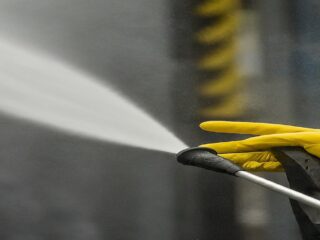
Enhancing Workplace Hygiene and Productivity: The Significance of Regular Deep Cleaning in Industrial Facilities
Are dust bunnies and grime taking over your industrial facility, silently sabotaging your team’s productivity? Picture this: machines humming in a spotless environment, employees moving efficiently in a clean workspace – the scene of a well-oiled productivity machine. What if we told you that regular deep cleaning practices are the key to unlocking this ideal scenario? Worry not; this article delves into the crucial link between workplace hygiene and productivity in industrial settings. We’ll unveil the hidden power of periodic deep cleaning and offer insights into why maintaining cleanliness isn’t just about appearances but a fundamental aspect of operational success. Let’s discuss commercial deep cleaning services, safety concerns, and maintenance strategies, equipping you with actionable tips to foster a safe, healthy, and productive work environment in your industrial facility. Join us to discover how a squeaky-clean workplace can pave the way for enhanced productivity and employee well-being.
Introduction to Periodic Deep Cleaning in Industrial Facilities
Maintaining a clean and hygienic environment in industrial facilities is of paramount importance. Not only does it contribute to the well-being and safety of employees, but it also plays a crucial role in maximizing productivity levels. Regular deep cleaning routines are essential to ensure a healthy work environment and maintain the facility’s overall efficiency.
Cleanliness directly impacts employees’ productivity and morale. A clean and organized workspace fosters a sense of pride and professionalism among workers, increasing motivation and job satisfaction. On the other hand, neglecting cleanliness can result in a cluttered and chaotic environment, hindering productivity and focus.
Furthermore, a clean workplace helps prevent the spread of germs and reduce the risk of illnesses. Industrial facilities often harbor contaminants, including dust, debris, and harmful pathogens, posing serious health risks if left unaddressed. Regular deep cleaning eliminates these potential hazards, creating a healthier and safer work environment for all employees.
Moreover, a clean and hygienic industrial facility leaves a positive impression on clients, visitors, and stakeholders. It reflects the organization’s commitment to quality, professionalism, and attention to detail. A well-maintained facility not only enhances the business’s image but also instills a sense of confidence in customers, ultimately contributing to its success.
In the following sections, we will explore the correlation between hygiene and productivity in industrial facilities, delve deeper into the significance of regular deep cleaning practices, and discuss the best practices for effective cleaning routines in these environments. Let’s examine how regular deep cleaning can create a safe and healthy work environment while optimizing overall productivity.
The Relationship Between Hygiene and Productivity in Industrial Facilities
Maintaining a high level of hygiene in industrial facilities is not only essential for the health and well-being of employees, but it also directly impacts productivity. A clean and safe work environment reduces the risk of accidents and injuries and creates a positive atmosphere that promotes focus, efficiency, and overall job satisfaction.
Health Implications of Poor Hygiene
Neglecting hygiene in industrial settings can have severe consequences for employee health. Dust, dirt, and other contaminants can accumulate on surfaces, machinery, and equipment, leading to allergies, respiratory issues, and other health problems. This can result in increased sick leave, reduced employee morale, and decreased productivity.
Impact on Employee Performance
The cleanliness of the work environment plays a significant role in employee performance. A cluttered and dirty workplace can be distracting and make it difficult for workers to concentrate. On the other hand, a clean and organized workspace helps create a sense of professionalism and boosts employee morale. Employees who feel comfortable and proud of their work environment are more likely to be motivated and engaged, leading to increased productivity.
Efficiency and Workflow
A clean and well-maintained industrial facility promotes smooth workflow and efficient operations. When equipment and machinery are regularly cleaned and properly maintained, they are less likely to break down or malfunction, reducing downtime and improving overall productivity. Additionally, a clean and organized layout eliminates obstacles and allows for easier access to tools and materials, facilitating a seamless workflow.
Safety and Risk Prevention
Hygiene and safety go hand in hand in industrial settings. Regular cleaning and sanitation practices help eliminate slippery floors, debris, or chemical spills. A safe work environment reduces the risk of accidents and injuries, ensuring employees can work confidently and efficiently. By prioritizing hygiene and safety, industrial facilities can reduce the likelihood of workplace incidents and maintain a positive work atmosphere.
Concluding, the relationship between hygiene and productivity in industrial facilities is undeniable. By maintaining a clean and safe work environment, employers can enhance employee performance, reduce health risks, and improve business productivity. Regular deep cleaning routines and adherence to hygiene standards should be integral to every industrial facility’s maintenance program.
The Significance of Regular Deep Cleaning in Industrial Facilities
Regular deep cleaning is not just a matter of aesthetics; it plays a vital role in maintaining hygiene levels and maximizing productivity in industrial facilities. Neglecting deep cleaning practices can have serious consequences that jeopardize the health and well-being of employees and the overall efficiency of operations.
1. Minimizing Health Risks
Industrial facilities are often prone to accumulating dirt, dust, and other contaminants, which can create a breeding ground for bacteria, allergens, and pathogens. Without regular deep cleaning, these harmful substances can pose significant health risks to employees, leading to increased absenteeism and decreased productivity. By effectively removing these contaminants through deep cleaning, the risk of respiratory issues, allergies, and illnesses is minimized, creating a healthier work environment.
2. Preventing Equipment Malfunction
Industrial equipment is subject to heavy use and accumulates dirt and debris over time, impeding its performance and lifespan. Regular deep cleaning of industrial facilities ensures machinery operates optimally, reducing the risk of malfunction and expensive repairs. Well-maintained equipment enhances productivity and promotes a safer working environment by reducing the likelihood of accidents caused by faulty machinery.
3. Eliminating Cross-Contamination
In industrial facilities, cross-contamination can occur easily, especially in food processing, pharmaceuticals, or chemical manufacturing areas. Neglecting deep cleaning can lead to the transfer of contaminants from one area to another, potentially compromising product integrity and safety. By implementing regular deep cleaning practices, the chances of cross-contamination are significantly reduced, safeguarding product quality and maintaining compliance with industry regulations.
4. Enhancing Employee Morale and Performance
A clean and organized work environment contributes to employee morale and job satisfaction. Employees’ focus and productivity increase when they feel comfortable and safe in their surroundings. Cluttered and unclean workplaces can demotivate and even contribute to higher stress levels. Regular deep cleaning promotes a sense of pride in the workplace, boosting employee morale and creating a positive atmosphere that translates into improved performance.
Conclusion
Regular deep cleaning is critical to maintaining hygiene levels and promoting productivity in industrial facilities. Businesses can create a safe and efficient work environment that fosters success by actively addressing potential health risks, preventing equipment malfunction, eliminating cross-contamination, and enhancing employee morale. Neglecting deep cleaning practices can seriously affect employee well-being and overall business productivity, making it essential for industrial facilities to prioritize and implement effective deep cleaning routines. Contact VATES Facilities SUpport WLL Bahrain or send us an email to sales@vfsupport.com




Leave a Reply